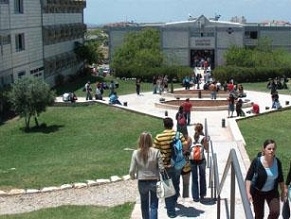|
World Jewish News

The Ariel Univsersity of Samaria.
|
Netanyahu to world leaders: ‘History will judge harshly those who equate democratic Israel, which is establishing a university,
09.01.2013, Israel and the World Israeli Prime Minister Benjamin Netanyahu on Tuesday hit back at critics of his government’s decision to upgrade an institution in a disputed Jerusalem neighbourhood to university status, as he insisted: “The danger to the world is not a university in Ariel... The danger is Iran, which is building nuclear weapons. The danger is Syria's arsenals of chemical weapons.”
On a visit to the Ariel University of Samaria, which has been the subject of widespread international criticism since last year’s politically-sensitive decision to upgrade its status, Netanyahu issued a rousing call to world leaders for proportionately, as he insisted “we remain faithful to our homeland. We will continue to defend our citizens, develop our country and build in our land”.
“History will judge harshly those who equate democratic Israel, which is establishing a university, and dictatorial regimes that slaughter their people and which hold atomic weapons of mass destruction,” he further cautioned as he sought to dissipate international backlash over Israel’s recent series of settlement expansion announcements in the wake of the Palestinian Authority’s successful appeal to the UN General Assembly for non-member observer status last November."
Outspoken critics of the Ariel initiative have included Britain, with Foreign Office Minister for the Middle East Alistair Burt condemning the decision to create “the first university in a settlement illegal under international law” in a December 26 statement responding to the announcement issued by Jerusalem to coincide with the Christmas break across the majority of western governments.
A week before, British Foreign Minister William Hague issued a ringing indictment of Israeli settlement activity, describing it as “a serious provocation and an obstacle to peace”. “It is deeply disappointing that despite the international community repeatedly raising our concerns, Israel continues to press ahead with plans to expand them,” he added.
France has also been a fierce opponent of what it deems to be Israel’s “colonisation projects” in the West Bank and East Jerusalem, in light of its vote in favour of Palestinian statehood at the UNGA.
In addition to frequent and vehement condemnations of Israel’s successive settlement expansion plans, French Foreign Minister Laurent Fabius also responded to the government decision to upgrade Ariel in September in a press conference during which he insisted: “This measure, like all those to perpetuate or legitimise the colonisation of the Palestinian territories, can only further undermine trust between the parties. We therefore call on Israel to reverse this decision quickly.”
“We recall that we condemn colonisation in both the West Bank and East Jerusalem, considered illegal under international law and an obstacle to a just peace based on a two-state solution,” he added.
At his initial announcement of the upgrade plan in September, however, Netanyahu told his cabinet: “Ariel is an inseparable part of the State Israel and it will remain an inseparable part of the State of Israel in any future agreements just like the settlement blocs”.
Adding that the move was designed to “strengthen higher education” in the Jewish State, rather than further assert its authority in the contested West Bank region, he concluded it was “important that there be an additional university in Israel; it is important that there be a university in Ariel”.
Hague responded that the decision was particularly ill-timed in light of “rapidly expanding cooperation between UK and Israeli universities, and when the British government has taken a firm stand against those who seek to undermine Israel’s legitimacy by boycotting educational and cultural institutions”.
The move has not been universally popular domestically either, with as the Council of Presidents of Israeli Universities describing it as a “political decision...there is no need for another university in Israel. This is a step that serves the coalition and political interests and is bound to spell disaster for higher education in Israel”. Fast-approaching elections on January 22 in Israel are predicted to be a close-run affair with Netanyahu’s approval rating likely to be threatened by increasingly positive polling by the far-right wing Habayit Hayehudi party.
It has also drawn criticism from the left wing, who fear that upgrading Ariel’s status would signify a stepping up of Israel’s occupation of the West Bank and prompt criticism from the international community.
EJP
|
|
